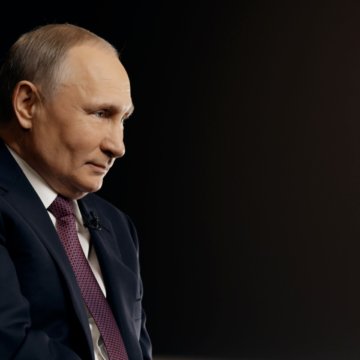- About
- Topics
- Picks
- Audio
- Story
- In-Depth
- Opinion
- News
- Donate
- Signup for our newsletterOur Editors' Best Picks.Send
Read, Debate: Engage.
| topic: | Election |
|---|---|
| located: | Russia |
| editor: | Igor Serebryany |
Russia has swiftly been submerging in the doomsday atmosphere pumped in by the line of recent events, both objective and "homemade".
In less than a week, Russian authorities declared emergency measures to contain the coronavirus threat; warned about water shortages coming due to an abnormally warm winter and the Ruble nosediving against the U.S. Dollar and Euro following the collapse of oil prices provoked by Russia's withdrawal from OPEC-Plus deal.
And, finally, the parliament, State Duma, declared on Tuesday it is going to hold early elections in September, a year ahead of schedule.
All that has been happening as president Vladimir Putin pushes constitutional reforms aimed at cementing his grip of power indefinitely.
The bill was introduced by Alexander Karelin ("United Russia"). Earlier this month, leader of the nominal opposition but de-facto pro-Kremlin Liberal Democratic Party, Vladimir Zhirinovsky, also called to hold parliamentary early elections on September 20, 2020.
Several MPs reached by phone on Tuesday said that the Karelin's move was agreed with the administration. Moreover, they said the Kremlin was behind the idea voiced by Karelin.
Still, in a rare twist, State Duma refused to approve the initiative originated from the Kremlin. The bill was "sabotaged" by the Communist faction. Even President Vladimir Putin who arrived at the Duma hastily failed to persuade the opposition MPs to support the bill. Putin's position in recent weeks is that all dramatic changes in the country's political system must be passed by consensus.
Seeing a lack of consensus this time, Putin reluctantly dropped the offer and Alexander Karelin has formally withdrawn "his" bill immediately.
The strange exchange between Russia's almighty leader and the MPs shows that currently in the country all initiatives become obsolete even before they make it to the political powerhouse, a member of the Russian Political Consultants Association, a professor in the Moscow State University Grigory Kazankov says.
"In quiet circumstances, it could be suggested that the United Russia has calculated that its chances to win the elections on schedule and with no rigging are slim. In principle, the early election is a way for a sinking ship to drop anchor in a relatively safe harbour without the need to sail into troubled waters", he says.
However, ship "Russia" has already entered the troubled waters, an expert stresses. That makes any long-term forecast over the fate of its political institutions senseless.
"In this country as well as internationally, the situation changed last weekend. Who could foresee that oil, securities and ruble would all collapse overnight? Who can predict the coronavirus repercussions? In these circumstances, politicians are unable to make decisions with longer than a few-weeks' horizon", Kazankov says.
The proposal to hold early parliamentary elections is a "Freud's lapsus", director of the Center for Electoral Technologies Vladimir Pyzin believes.
"The proposal means that the United Russia can simply fail to survive into 2021 as a politically credible structure. The proposal means its authors, whoever they are, don't believe in the ruling party capacities. The UR's credibility has completely been based on the so-called national projects initiated by Vladimir Putin. So questioning the party's future is the same as questioning Putin's projects by those who are in charge of executing them", Pyzin says.
It is obvious that the UR can only exist as a ruling party. In opposition, it would not last a day. The attempt by its MPs to call on early elections means the party is aware that Putin's "national projects" will go down in flames, director of the High School of Economics' Center for Development Natalia Akindinova says.
"Implementation of the projects of the national scale requires the highest degree of professional skills and talents. In Russia, the majority of high-ranking officials lack them, the bureaucracy is notoriously inefficient. Following the weekend's collapse the chances that the 25-trillion-Ruble worth of national projects set to be implemented will become even slimmer", she says.
In addition, on Tuesday, the State Duma voted - this time, with no major dispute, a proposal which gives green light for Vladimir Putin to stay in power indefinitely. The game-changing bill was tabled by the female veteran astronaut Valentina Tereshkova. The vote flushed out the two-month-long discussions over constitutional reforms in a blink of the eye.
"The authorities agree in general that Russia is doomed. So they are in a hurry to secure their power today until it could be too late", political expert Abbas Galliamov explains the rush.
If the president signs the bill into law (and he will), Putin will rid of his "lame duck" image and can stay in power until 2036.
Image: kremlin.ru
